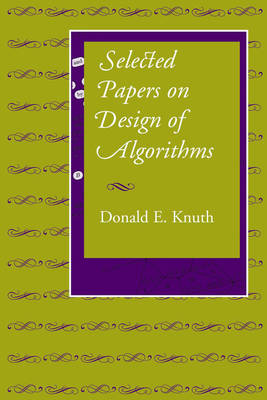
- Retrait gratuit dans votre magasin Club
- 7.000.000 titres dans notre catalogue
- Payer en toute sécurité
- Toujours un magasin près de chez vous
- Retrait gratuit dans votre magasin Club
- 7.000.0000 titres dans notre catalogue
- Payer en toute sécurité
- Toujours un magasin près de chez vous
Description
Donald Knuth's influence in computer science ranges from the invention of methods for translating and defining programming languages to the creation of the TEX and METAFONT systems for desktop publishing. His award-winning textbooks have become classics that are often given credit for shaping the field; his scientific papers are widely referenced and stand as milestones of development over a wide variety of topics. The present volume, which is the seventh in a series of his collected papers, is devoted to his work on the design of new algorithms. It covers methods for numerous discrete problems such as sorting, searching, data compression, optimization, theorem-proving, and cryptography, as well as methods for controlling errors in numerical computations and for Brownian motion.
Nearly thirty of Knuth's classic papers on the subject are collected in this book, brought up to date with extensive revisions and notes on subsequent developments. Many of these algorithms have seen wide use--for example, Knuth's algorithm for optimum search trees, the Faller-Gallagher-Knuth algorithm for adaptive Huffman coding, the Knuth-Morris-Pratt algorithm for pattern matching, the Dijkstra-Knuth algorithm for optimum expressions, and the Knuth-Bendix algorithm for deducing the consequences of axioms. Others are pedagogically important, helping students to learn how to design new algorithms for new tasks. One or two are significant historically, as they show how things were done in computing's early days. All are found here, together with more than forty newly created illustrations.
Spécifications
Parties prenantes
- Auteur(s) :
- Editeur:
Contenu
- Nombre de pages :
- 453
- Langue:
- Anglais
- Collection :
- Tome:
- n° 191
Caractéristiques
- EAN:
- 9781575865829
- Date de parution :
- 15-04-10
- Format:
- Livre broché
- Format numérique:
- Trade paperback (VS)
- Dimensions :
- 150 mm x 226 mm
- Poids :
- 635 g

Les avis
Nous publions uniquement les avis qui respectent les conditions requises. Consultez nos conditions pour les avis.






